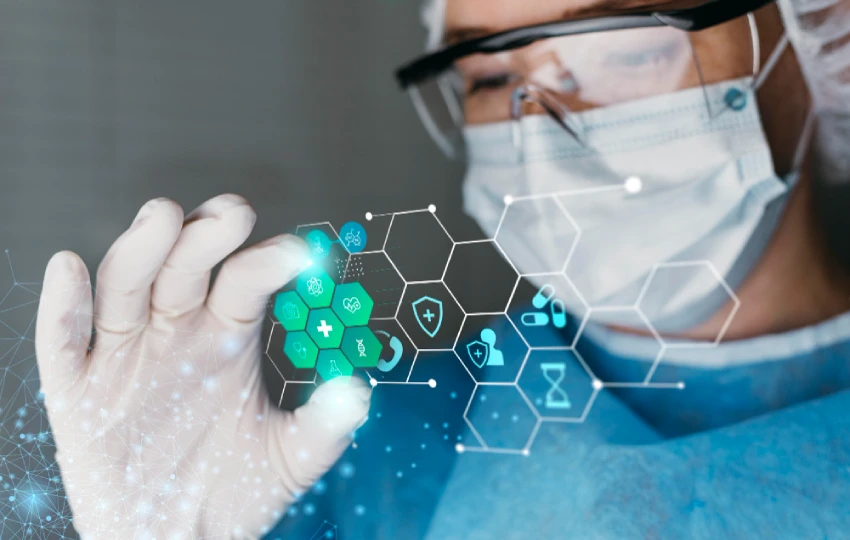Artificial intelligence is revolutionizing various sectors, with healthcare being one of the most significantly impacted. By processing vast amounts of data and delivering meticulous estimations, AI has the potential to transform medical diagnosis and treatment, heralding a new era in the future of healthcare.
- How have smart algorithms changed the medical field?
- What advancements have artificial neural networks made in diagnosis and treatment?
- In what ways will healthcare evolve in the future?
- What should be considered when employing AI in healthcare?
This article provides all the answers and insights about artificial intelligence’s promising impact on the healthcare sector.
The Evolution of AI in the Medical Field
The sphere of smart technology implementation in the wellness industry is predicted to reach around $188 billion by 2030. As medicine requires constant development, it has a long history of adapting to new scientific advances to maximize patient care and, thus, results. The fast progress of technology has brought considerable changes to what healthcare looks like at its different stages.
Early Years
The timeline of AI in healthcare extends far back to the 1950s when smart algorithms were devised to deal with error-prone data. Thus, the newly created systems performed basic tasks that have since become standard computer functions.
The Advent of Machine Learning
Thanks to continuous evolution, around the 1990s-2000s, scientists managed to train AI for enhanced machine learning techniques. One example is support vector machine modeling for diagnosing common diseases, like diabetes and pre-diabetes, in the population.
In addition, this timeframe saw other AI applications. The list includes imaging analysis, pattern recognition, and data mining for clinical decision support systems (alerts, reminders, guidelines, order sets, etc.). With the dataset labeling tools, it has become easier to track any traumas or irregularities in medical images and treat them quickly and easily. Moreover, profound research in natural language processing (NLP) allowed for data collection from medical records and literature.
Big Data and Deep Learning
Better computers, more data, and smarter algorithms made progress faster. Powerful deep learning methods like CNNs greatly improved medical image analysis. AI helped diagnose, predict, personalize therapy, and discover new treatments.
The Big Discoveries
Technological breakthroughs have consistently facilitated significant progress in medicine, presenting new ways to detect and treat different diseases. Here are the most prominent ones we use today:
- Imaging tests, like X-rays, MRIs, and CT scans, help identify disorders for further treatment.
- Mobile apps that rely on sensors allow for continuous monitoring of patient’s activity levels, vital indicators, and other variables constantly.
- Virtual health assistants, like HelloRache and Nuance, provide enhanced medical services, including reminders, medical appointment scheduling, etc.
Smart neural networks have significantly evolved since their very beginning, granting us access to more enhanced healthcare. The results are fantastic – never-before-seen resources for analyzing big data and refining medical procedures.
How AI Makes Diagnostics and Treatments Better
The healthcare systems globally are constantly facing various new difficulties, ranging from increasing patient volumes to the emerging intricacies of chronic illnesses. Therefore, the industry can’t rely on only human work, thus requiring innovative solutions.
There is a clear need for more effective and accurate diagnostic and treatment approaches, and smart algorithms are excellent for these tasks. Over the years of AI development, healthcare has seen the following advantages.
To address patient queries more efficiently, many healthcare facilities are implementing a rag chatbot that uses AI to respond instantly to common health inquiries. Another innovative application involves integrating chatbots into electronic health records to prompt healthcare providers with real-time, data-driven advice.
Quick and Convenient Management of Complex Files
The medical sector revolves around copious amounts of information. Smart technology allows for the immediate organization of big data, which enables gathering, storing, and analyzing digital health records related to disease risks.
These capabilities further extend to speeding up the process of finding and using precise patient detail and reducing the time needed to pinpoint and fix disorders.
More Personalized Approach to Therapies
All patients have different genetic backgrounds and health histories. Therefore, it’s important to create an adequate action plan for each. In this case, machine learning comes in handy by analyzing medical records and genomics.
This comprehensive understanding enables healthcare providers to create precisely customized treatments, which leads to increased effectiveness and fewer side effects.
Improved Precision and Speed of Detecting Disorders
Timing is crucial in identifying severe diseases. AI excels in making medical predictions, particularly in radiology, where it analyzes extensive health data to swiftly and accurately recognize patterns and irregularities, enabling early detection and intervention, thus shaping the future of healthcare.
By analyzing extensive physical health data, trained algorithms can swiftly and accurately recognize patterns and irregularities. This function is crucial for the early detection of severe conditions like cancer. As a result, a patient gets a timely therapeutic intervention.
Innovative Drug Development
The discovery of enhanced recipes for addressing diseases is vital. Smart algorithms continuously process vast biological and chemical data swiftly. It allows for creating more efficient compositions. This also speeds up the identification of potential drug prospects.
By automating this process, the industry can reduce overall development expenditures. Moreover, deep learning enhances clinical trials by aiding in design, candidate selection, and progress monitoring. As a result, it ultimately improves the efficacy and safety of new medications.
Timely Incident Management and Risk Prevention
Supervision is critical when caring for a patient, and ensuring auditable and traceable data is essential. AI has made this process easier, enhancing transparency in reporting.
The integration of AI-based technologies into the hospital’s existing software allows for real-time event tracking and investigating root causes. The system notifies all parties involved and references incident-related policy papers. This helps track progress, update status, and request input or comments from personnel.
What to Expect in the Future?

Having contributed a lot to the medical sector, smart technology doesn’t plan to stop at the achieved progress. AI-driven technologies are to blend even better, changing how we handle healthcare and bringing new mind-blowing solutions.
New technological advances in precision will aim to offer extremely accurate testing details by analyzing a patient’s genetic and molecular profiles. This will further contribute to customized treatments and therapies accordingly.
In addition, combining AI with electronic health records will allow for the storage of more substantial patient data, leading to faster assessments and treatments, further advancing the future of healthcare.
Bright examples of the present creations are robots that assist in surgeries. They’re accurate, never get tired, and don’t have biases. This is highly beneficial for healthcare. For instance, the Da Vinci Surgical System helps make small, precise cuts, and surgeons control the process from a console. Such innovations will become more efficient in the coming years, allowing full-fledged operations.
People will become more used to receiving treatments with AI’s help. Robotic technology has already become more integrated into healthcare, but patients and their families still cautiously approach its blessings, including innovative predictive analytics and machine learning algorithms.
This stems from concerns about data security and diagnostic accuracy. Naturally, people would trust humans more than machines. However, AI-driven medical software will continue to seek ways to address these concerns. Those in need will receive individualized care and have access to data and medical assistance around the clock, building trust in machines.
Possible Obstacles to AI Development
With new advancements inevitably come numerous challenges. This demand comes from requirements for ensuring patient data privacy, ethical concerns, and incorporating AI into current healthcare systems. Consequently, the industry has to consider the following:
- Data quality. Medical information originates from various sources, including smart devices like fitness apps and monitors. The accuracy of AI systems relies heavily on the quality of input provided.
- The security of patient information. Since smart algorithms must deal with copious amounts of data, maintaining complete confidentiality and HIPAA compliance becomes more challenging but still crucial.
- Upholding ethics. Healthcare is a highly complex sector. Therefore, it requires balancing the role of robotic systems in decision-making with human judgment. The results should be unbiased and fair, making it a difficult task for AI.
- Combining innovative features with existing algorithms. Integrating AI tools with current systems poses challenges in compatibility, training, costs, and effectiveness. Addressing these obstacles is crucial for realizing the full potential of AI in the future of healthcare.
The development of AI brings numerous miracles to the healthcare sector, but maintaining its fast-evolving pace may be challenging in several crucial aspects. Addressing the above issues will yield incredible results in the medical industry, improving patient care and overall healthcare.
Conclusion
These days, the power of smart technology continues to be compelling, improving our lives with each emerging innovation. Its sophisticated capabilities have become well-recognized in the medical community. Thus, the industry has seen numerous, literally life-changing advancements.
The ones of the main things in successful health treatment is early detection. AI has helped enhance the efficiency of identifying different diseases in a timely manner. This allows for the prompt creation of appropriate treatment plans.
Based on the current breakthroughs, AI-driven healthcare has a promising future with transformative possibilities. As new risks will emerge, inevitably, there will be challenges along the way. By addressing these challenges with care and dedication, the healthcare sector can harness the full power of AI to improve patient care, ensuring a promising future for healthcare.
Discover More at Health Hub
For more insights on how AI is revolutionizing healthcare and to stay updated with the latest advancements, visit Health Hub. Join us in exploring the future of medical technology and its impact on patient care.

